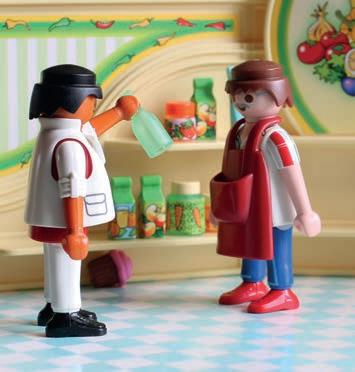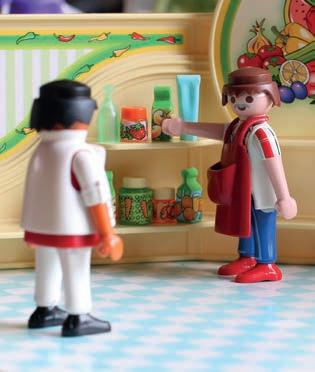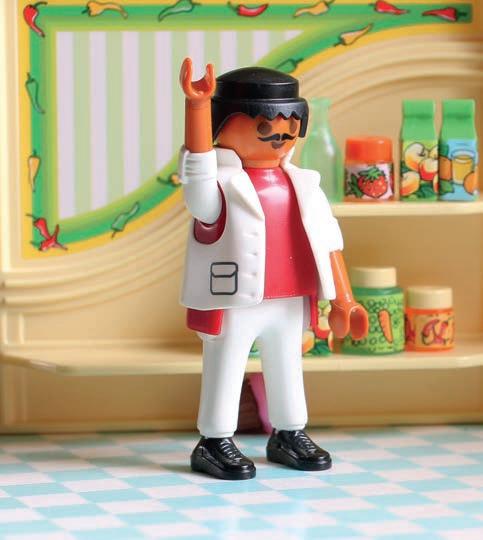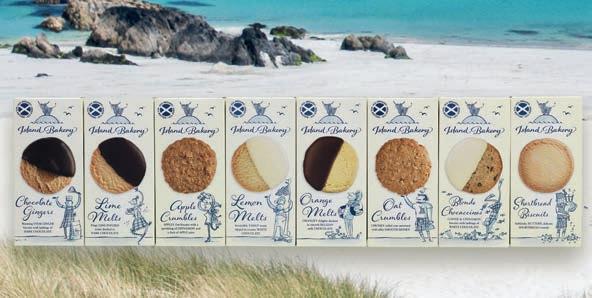
11 minute read
SHOP TALK
from FFD March 2021
IF I’D KNOWN THEN WHAT I KNOW NOW...
STEVE LANE, owner, Lane’s Deli & Fine Foods, Lutterworth, Leicestershire
Much of my working life has been spent on the road, touring with bands such as Iron Maiden and Shed Seven, as a ‘rock & roll’ coach driver. When you travel all over Europe, you try a lot of different foods, so owning a deli became a dream of mine.
In 2017, when my sister lost her battle with cancer, it made me think that life is too short not to follow your dreams. My wife and I moved to a village just outside Lutterworth and started looking at premises. I didn’t do any formal market research but figured that if there was a Waitrose in town, it must be the right demographic.
We took over the lease of a former cake shop and fitted one half out as a deli and the other as a café-bistro with eight covers. We were serving charcuterie and cheese platters, and breakfast and lunch options, and were soon up to 20 covers. People liked the cosy, ‘packed in’ ambience.
Then the pandemic hit. During the first lockdown we realised that operating as a café with social distancing wasn’t viable. Instead, we decided to focus on retail with a small take-away menu. We moved the deli counter from the back to the front of the shop and installed some shelving for fresh produce. We reopened last July, reducing our opening days from five to three (Thursday, Friday and Saturday).
When people ask how things are going, I tell them we are surviving. Turnover hasn’t changed that much – £120,000 this year compared with £130,000 the year before – but profit has. When we had the café, if two people spent £20 on breakfast, about £10 of that was profit. Now, when people spend £20, only £5 is profit. But the numbers are creeping up every week.
It probably helps that I don’t like sitting on stock. We only order what we need and what you see on the shelves is what we have in. Every Wednesday I go to the market at 5:30 am to buy all our fresh produce. We also know exactly what we have sold each day because we invested in a decent till system at the outset.
Getting people through the door is the biggest challenge. Once they have shopped here they usually come back. I would say that just 5% of our customers are people who used to come into the café. I had hoped more would stay loyal.
I honestly don’t know whether this model is sustainable. When I first started the business, I did a retail course and remember being told that if you make 35% gross margin you are doing alright, but if you can make 40%, you can book a skiing holiday. I always keep that in mind and maintain decent margins, but the holiday will have to wait for now
CONFESSIONS OF A DELI OWNER
ANONYMOUS TALES FROM BEHIND THE COUNTER
WE ARE GOING to close the high street and have a street party! It’s o cial, we announced it in our Chamber of Commerce meeting last night (yes we do have the authority, Jackie Weaver). Date to be nalised. Hopefully in May or June.
A er last month’s bleakness (sorry about that), nally, those green shoots are here. Spring is coming both literally and metaphorically. Snowdrops are out and da odil buds are appearing. My shop is very much like a bulb that has withdrawn into itself over the winter of COVID. The vaccine and lowering R rate is sunshine, warming the soil around my business and all around my town.
COVID will leave a weird legacy but it’s not all bad. We get more people at our Chamber of Commerce meetings online than we did in real life, and that’s without the sandwiches. But now people come and listen from the comfort of their own homes.
The enthusiasm for hosting a town event is big. The burning desire for release is bubbling through the town like lava. People want out. That sense of community which has been so
strong in 2020 now wants to party. Already we have local bands that want to play, local hire companies o ering kit, schools that want to march, dancers that want to dance – all for free.
Food and drink have been at the centre of our very personal isolation through COVID. And food and drink is going to be front and centre in these celebrations.
The doors of shops and homes are going to open – and stay open – in my town.
There are a few local ladies who have been cooking ready-meals for the food bank. The EHOs kicked up a fuss, saying their kitchens required certi cation. These ladies have families, cats, dogs and lives that are already hard enough, so they said ‘no’.
And, miraculously the EHOs backed down (or the council did or whoever makes and unmakes these decisions). The users of the food banks wanted the ready-meals, and the ladies wanted to cook. It was something they could do, and do well. Two or three of them are our customers, and we helped out by getting them foil trays etc.
That attitude, the ‘do what we can, while we can’, is hopefully here to stay. I get a sense that locals don’t want to let this sense of community slip away again. Local producers, local shops, local businesses, local employers. None of these things are ‘nice to haves’, or ‘middle-class aspirations’. They are us. And coming out of COVID we are going to try harder to hang onto that.
Bring on the celebrations!
MODEL RETAILING SOLVING EVERYDAY SHOPKEEPING DILEMMAS. IN MINIATURE.


Excuse me, is any of this compostable packaging?

Well, this one is ‘compostable’, this is ‘home compostable’, this is ‘industrially compostable’ and this one has some kind of enzyme in it that breaks it down… And this one?
Well sir, that’s just a plastic bottle.
FFD says: The world of sustainable packaging is a minefield – for both retailers and consumers. And as many of your customers will show interest in it, it’s important that you and your staff know exactly what the terminology for each type of material actually means. It’s easy to be bamboozled by the catalogue spiel and then pass something on to your customers just because it sounds good. Make sure that you can explain things. In some ways, it’s no different to knowing the stories behind the food inside the pack.
editorial@gff.co.uk
THE DELI DOCTOR
Paul Thomas
Technical and regulatory advice from the Guild of Fine Food’s deli helpline
Q: If we receive a food that is recalled due to
Listeria, is it possible to cook it in our café to avoid wastage?
A: Technically, pathogens that are susceptible to heat treatment – such as Listeria monocytogenes – can be inactivated (killed) by cooking to a time-temperature combination that is equivalent to pasteurisation, or higher. Cooking cannot, however, be used to remove heat-stable toxins that have been produced by some microorganisms such as Bacillus cereus or coagulase-positive staphylococci.
Article 7 of Regulation (EC) 2073/2005 requires that when a food does not meet the food safety criteria stated in that regulation, as would be the case when Listeria monocytogenes was detected in a ready-to-eat food able to support the growth of that organism, it should be withdrawn or recalled. Withdrawal refers to the removal of food from the food chain where it has not yet reached retail level, while recall is the removal of food from the food chain that has reached retail level (and may therefore have reached consumers).
The regulation goes on to state that

While it is possible for a manufacturer to subject contaminated food to heat treatment, a retailer cannot do this.
“products placed on the market, which are not yet at retail level and which do not fulfil the food safety criteria, may be submitted to further processing by a treatment eliminating the hazard in question. This treatment may only be carried out by food business operators other than those at retail level.”
While it is possible for a food manufacturer to subject a contaminated food to a heat treatment that will eliminate the hazard, a retailer cannot carry out this process.
In the case described, a food that is known to be contaminated by Listeria monocytogenes cannot be cooked and served by the retailer. Instead, the food should be quarantined, and the supplier should be notified of the quantity of remaining stock from any recalled batches.
Dairy and food safety specialist Paul Thomas runs the Guild’s e-helpline for retailers with technical or regulatory queries. Send your questions to myguild@gff.co.uk
Expert’s eye
LUCY KNIGHT OF INSIGHT6 EXPLAINS HOW TO BEST INTRODUCE YOUR CUSTOMERS TO CHANGES IN YOUR BUSINESS
There are three key things to think of when wanting to bring in any change to your business, be that a sustainable shift or even just a new retail concept.
Firstly, know your brand and your customers. Be clear on what your brand or proposition is and why it does and says what it does. Also be clear about who your customers are: What’s the demographic? How do they buy? What else do they buy? Having this context clear in your mind will help you explain your reasons to customers.
The second thing is to communicate any changes that you’re going to make clearly and in a timely manner – and repeatedly as well. We tell our clients all the time that people don’t read signs. You’d think that with the current situation people would be looking for them, but they still don’t. So, you can’t over-communicate this stuff. If you think you’ve explained it well enough, you probably still haven’t, and you’ll need to do it again perhaps in slightly different language and a different tone.
Lastly, involve your customers in the change. Asking for your customers’ opinions before making decisions is a good place to start. Don’t do the ostrich thing of making a decision, burying your head in the sand and waiting for things to blow over. Canvass opinion. Then, in your communication about your changes you can say: ‘We recently asked you…’, so we’re doing this for
People don’t read signs. You’d think that people would be looking for them, but they still don’t.
these reasons’, and then the decision comes from them as well. They’re there with you on the journey, and that makes the buy-in much easier.
If you do get some grumbles, remember that it’s totally natural – some people don’t like change. Being open to discussion and don’t get defensive. Ask them why they feel the way they do and explain your reasons for making the change.
If you’ve got the first bit right – knowing your customers and your brand – and if you can justify the reason you’re doing what you’re doing, you should be able to convince them.
WHAT’S TRENDING
1 NICK BAINES KEEPS YOU UP TO DATE WITH THE NEWEST DISHES, FLAVOURS AND INNOVATIONS IN FOOD & DRINK
2
3
1 Everything Bagel Spice For those that find making decisions difficult, the Everything Bagel is a lifeline, incorporating all the classic seasonings in one – poppy seeds, sesame seeds, garlic, onion and salt. And in the US, some trendy chefs have been experimenting with this seasoning further – using it in with roasted veg, pastries, pizzas and stuffed pittas as well as topping hummus and avocados. The trend has taken an even quirkier turn, with ice cream producers from Chicago to New York City also getting in on this unique seasoning. As well as Pretty Cool Ice Cream and Ice & Vice, ice cream powerhouse Jenni’s has made a cream cheese ice cream with everything bagel seasoning gravel.
2 Rosé Waitrose recently reported that autumn’s rosé sales were up 57% – following last May’s bump in pink wine sales of a whopping 407%. However, it’s not just in the supermarket where rosé is booming. Canned wine baron Nice has seen its rosé sales on Amazon increase by more than 5000%. Celebrities have also jumped on the bandwagon, with lines launched from Kylie Minogue, Sarah Jessica Parker and rapper Post Malone. Neilsen data shows rosé grew ahead of the market in 2020 by 24.8% and is now worth £505 million, a sign that pink wine is no longer just a summer-time sipper, but an allout perennial favourite.
3 Rethinking merchandise A whole slew of London restaurants and foodservice operators are pushing merchandise in a big way. Focusing predominantly on T-shirts, these food businesses are recruiting illustrators and artists for collaborations and limited edition runs. Soho’s Sri Lankan outfit Hoppers are in on the action, as are relative newcomers Taco Queen. Merch provides another revenue stream and marketing in one fell swoop, and customers are starting to represent their favourite food haunts in much the same way they would support a football team. Just look at the Monty’s Deli t-shirt, which has gained a cult following that rivals its Reuben sandwich.













